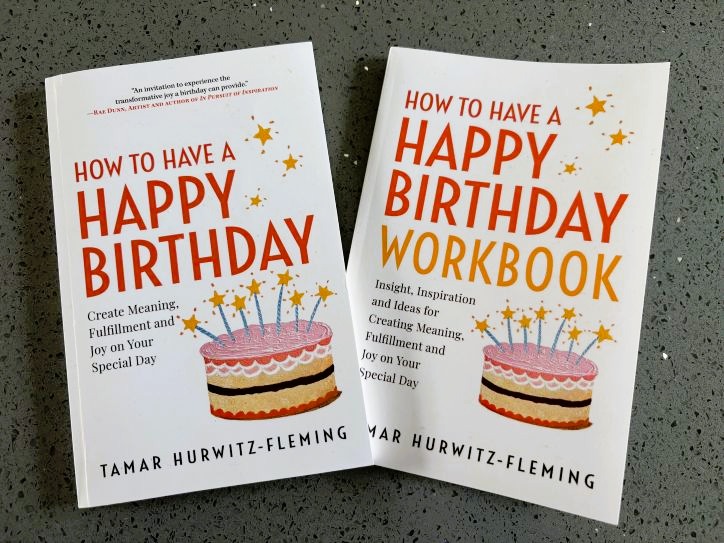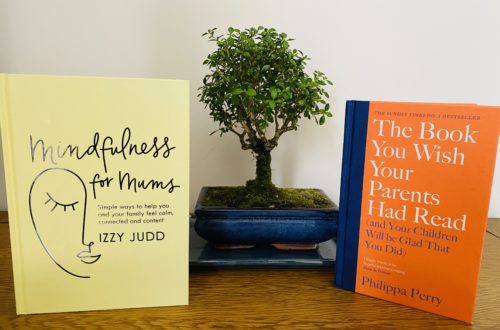
Dreading your birthday? Here’s how to make it a happy one!
Review of How to Have a Happy Birthday by Tamar Hurwitz-Fleming (2024, 146 pages)
A couple of years ago, I reached a significant milestone and celebrated a big birthday! My husband had thoughtfully organised a surprise birthday dinner, and we had a wonderful evening surrounded by close family. However, amid all the joy and merriment, I found myself grappling with mixed emotions about entering a new decade. I tried to focus on the positives (and there were many!), but deep down, I was struggling with the idea of ageing. Being young at heart, I didn’t feel ready to embrace the number I had turned and I couldn’t help but mourn how quickly time seemed to be passing by.
As author Tamar Hurwitz-Fleming observes in her book How to Have a Happy Birthday*, ‘birthdays have a profound way of magnifying our insecurities’ (p. 6). While birthdays are often joyful occasions filled with fond memories, they can also stir up difficult emotions. They may highlight challenging life circumstances, bring unresolved tensions to the surface, and amplify our personal fears.
*Disclosure: I received a complimentary copy of How to Have a Happy Birthday from Book Publicity Services. I am reviewing the book voluntarily.
Whether we’re eagerly anticipating our next milestone or wishing we could skip the day entirely, how can we make the most of our birthday?
In How to Have a Happy Birthday, Hurwitz-Fleming leaves no stone unturned, exploring birthdays from a spiritual, psychological, and practical perspective. She offers thoughtful advice and personal anecdotes to address the common challenges that surface as your birthday approaches such as, overcoming the birthday blues, planning meaningful celebrations, embracing the spotlight, and recognising situations or behaviours that can sabotage your day. The book also provides inspiration for celebrating your partner, friends, colleagues, and family members and there is a chapter devoted to celebrating the birthdays of those who are seriously ill, helping readers to navigate these moments with sensitivity and care.
The author’s intention is to show the value of celebrating your birthday and to offer practical tips to make the day as happy and meaningful as possible. Check out Hurwitz-Fleming’s top suggestions to help you enjoy your special day, even if your are not in the mood this year!
Explore the discomfort around your birthday
Often, we sabotage our own celebrations to avoid facing uncomfortable emotions or situations. Hurwitz-Fleming invites us to tune into how we’re feeling in the lead up to our birthday and to explore any discomfort or resistance that arises. Here are a few familiar patterns of self-sabotage:
Shying away from the spotlight
We might downplay our birthday or pretend that we don’t want any fuss because it feels awkward or wrong to ask for what we really want. We may also struggle with putting ourselves first, taking up others’ time and, being the centre of attention. It’s therefore worth asking: How do you feel about celebrating yourself? What beliefs do you hold about spending time or money on yourself, and where did these come from?
Perhaps as a child you were given the message that it was not ok to take up space or you were taught to avoid being direct about what you want. You may have been told that it was selfish to put yourself first or that money was tight and not to be spent on frivolous activities. Gently challenge any unhelpful, limiting beliefs and consider what is true for you now, as a resourceful and capable adult who is inherently worthy of celebration and care.
Ignoring relationship problems
Sometimes birthdays can reveal deeper issues in our relationships. If a partner or loved one doesn’t acknowledge your birthday in the way you’d hope, it could reflect a broader, unaddressed pattern of behaviour that leaves you feeling overlooked or unimportant. Rather than expressing how hurt you feel, you may find yourself slipping into familiar habits: avoiding confrontation and pretending that it doesn’t matter (though inside, it does).
Hurwitz-Fleming encourages readers to view their birthday as ‘an annual thermometer that helps you gauge the temperature of your relationship’ (p.70). She also suggests that many of us unconsciously expect partners to take on the role our parents once did and celebrate our birthdays with the same effort and enthusiasm that was made when we were young. When they fall short, disappointment and resentment can follow.
Rather than suppress your feelings, Hurwitz-Fleming advises you to explore the roots of any tension in your relationship and to work on making your interactions as loving and appreciative as possible.
Avoiding difficult memories and emotions
For some, birthdays bring back painful memories and understandably, we may just want to push those aside, keep a low profile and treat the day like any other. If your birthday triggers memories of traumatic experiences, Hurwitz-Fleming suggests that you seek therapy to help you reclaim the day and find joy in your birthday again.
If this year’s birthday feels heavy, make space for your feelings. This might mean journaling, allowing yourself to have a good cry, and honouring memories of loved ones through small acts of remembrance. Then, when you’re ready, gently shift your focus to the future and the life you want to build going forward.
Feeling anxious about ageing
Birthdays often stir up insecurities around ageing. When we were children, each birthday felt like a joyful milestone that was greeted with excitement and cheerfully celebrated. But as we move through adulthood the tone shifts and soon enough the jokes and quips about ‘getting on a bit’ start rolling in!
There are many reasons why ageing gets a bad rap. Our caregivers may have passed down their anxieties around getting older or life events like illness or loss may have brought our own mortality into focus. On top of that, society frequently sends the message that ageing is undesirable and any signs of it should be concealed. With all these influences combined, it’s no wonder we feel uneasy as we approach our next milestone!
Hurwitz-Fleming urges readers to embrace ageing, pointing out that: ‘Every age has its beauty. Notice people older than you who radiate inner beauty and confidence…See them as your role models. And try to become that role model for others’ (p.13).
She also states that birthdays can be a useful wake-up call, reminding us that time is precious and that we should make the most of every moment. Our birthdays can therefore serve as an opportunity to check-in on where we are in our lives, reassess our goals, and think about the experiences we would like to have in the coming years.
Take control of your birthday
Remember: It’s all about you!
One of the best pieces of advice I received, when I was having a rotten time on my birthday one year, was to take charge of the day and treat it as an opportunity to do the things I love, rather than relying on others to make me happy. This aligns very closely with Hurwitz-Fleming’s core message, where she advises readers to ‘Use your birthday as a way to tune into your essential nature and discover what brings you unfettered joy’ (p.7).
Put yourself at the centre of the arrangements. Think about all the activities that bring you joy, reflect on how you like to spend your time, and then decide how you would like to celebrate your birthday.
Once you know what you want, let others know what you would like to do. If they are willing and able to join in, let them be a part of your special day. If not, go ahead and celebrate on your own terms, and have fun treating yourself to all your favourite things!
Release the pressure!
We often put immense pressure on ourselves to be the life and soul of the party and create the perfect celebration, but this can lead to unnecessary stress and even impact our health. Don’t let that pressure spoil your day! Give yourself enough time to plan and prepare for your celebration, make space for self-care, let go of any nonessential tasks, rope in some help and delegate when you can.
When considering what to do for your birthday, choose activities that are authentic to you, require minimal fuss, and help you to feel at ease. You don’t even have to cram everything into one day! Instead, you could choose to spread the activities out over a week. Most importantly, celebrate with people who love and appreciate you for who you truly are.
What does your birthday symbolise for you?
The book invites you to consider the meaning you attach to your birthday, helping you to celebrate it in a way that feels right to you. For example, is it about the satisfaction of reaching yet another milestone? Do you feel a deep sense of gratitude for the years you have lived and the experiences you have had? Is it a time for new beginnings, prompting you to reflect and reevaluate your life? Maybe it’s simply a celebration of you: a day to acknowledge your life and let others express their love and appreciation for who you are. Or does it serve as a wake-up call, a reminder of how quickly time passes and the importance of pursuing what matters most?
Treat your birthday like your own personal new year
A central part of any birthday celebration is gathering around a beautifully decorated cake, blowing out the candles, and making a heartfelt wish. Hurwitz-Fleming suggests that birthdays are an ideal opportunity to reflect on your intentions for the year ahead and to set yourself some achievable goals. Think about what you’d like to accomplish, the experiences you want to have, and how you hope to grow personally, and professionally. These reflections can even guide your friends and family, helping them to select meaningful gifts that support your aspirations.
To reinforce your desired direction and make your goals more motivating, Hurwitz-Fleming recommends that you phrase your wishes positively, stating the result or outcome you want to achieve rather than focusing on what you want to avoid. Take a small action towards your goal on or around your birthday to get your personal new year off to a flying start.
Preparing for the big day
Hurwitz-Flemming offers plenty of practical advice to help you plan your birthday celebrations and enjoy the day in a way that feels good to you. Here are some of her key tips:
- Declutter your space (and your mind!) – Whether you are hosting a big party and want a good tidy up before the guests arrive or you are taking the opportunity to have a personal reset and its ‘out with the old and in with the new’, consider decluttering your environment to create space and calm. But don’t just stop at the physical clutter, address anything that is taking up too much head space. This may mean resolving relationship issues, setting boundaries, simplifying your life, and tackling problems that are affecting your mental health. The goal is to feel both physically and emotionally ready to celebrate your big day.
- Create a wish list – If your friends and family are open to suggestions and ask you for ideas, let them know what type of gifts you would love to receive. Do you want a gift that supports a personal goal? Would you appreciate something unique and homemade? Are you yearning for new experiences (if so, what kind of experiences)? Are there any items you’ve had your eye on that someone could gift you, or would you prefer the freedom of choosing your own gifts with vouchers? Perhaps you’d rather be treated to a nice meal out? Or would a peaceful day to yourself be the perfect gift?
- Decide who you want to spend your day with – as well as considering who you would like to invite to your celebrations, think about your preferred group size and the type of socialising you enjoy. Do you thrive in large, lively groups or do you feel more at ease with a few close friends? Plan a day that includes the people and activities that energise and uplift you.
- Give people plenty of notice – If there are certain people you really want to celebrate with, make sure they’re free to come along and have the date and time booked in their diary. As calendars can fill up fast, send out invitations or share plans at least a couple of months ahead, especially if you’re organising a specific activity or event.
- Take the day off – If you can, book time off work for your birthday, make your request as far in advance as possible and block out your diary. If you are planning on celebrating hard, take the next day off too or ensure that day is kept free of meetings and other appointments!
- Plan ahead to avoid stress – give yourself enough time to prepare so everything runs smoothly and you can enjoy the moment. Write down everything you need to do, set a budget and save up, book a reputable venue, buy equipment/party pieces, arrange catering and entertainment, pick out your outfit, create a guest list and send out invitations well in advance.
- Avoid negativity at all costs – Hurwitz-Fleming notes that people can be more sensitive on their birthday. If at all possible, steer clear of emotionally charged conversations and people who drain your energy.
Finally, be kind to yourself! No matter how well you prepare, your birthday celebrations might not go exactly as planned. There are lots of things that are beyond your control, such as the weather, other people’s behaviour, or last-minute cancellations. What you can control is your mindset and how you respond. Hurwitz-Fleming urges you to show yourself some self-compassion. Choose to focus on what you can be grateful for in that moment, accept that the situation isn’t ideal but vow to enjoy yourself anyway, and then decide how you want to spend the rest of the day.
Celebrate your way!
Beyond throwing a party or having a get together, here are some additional ideas from the book to help you celebrate your birthday:
- Start with self-care – On your birthday, do activities that nourish your mind, body and soul. Begin the day with a relaxing and grounding morning routine, then treat yourself to your favourite comforts as the day unfolds.
- Get moving! Put on your favourite playlist and have a dance! Even if it’s just around the kitchen (personally, that’s where I throw my best shapes!)
- Enjoy your favourite meal. Whether you cook it yourself or someone else does the honours (bonus points if you don’t have to do the dishes!), indulge in your favourite food.
- Pamper yourself – take time to care for your skin, hair and nails (or book yourself into a salon and let them spoil you!) Spritz your favourite scent, put on your favourite clothes, and get as glam as you like!
- Eat cake! Hurwitz-Fleming is a strong advocate for birthday cake. As well as being a tasty treat, she writes that, ‘It’s an engaging ritual that allows for a focused moment of celebration. Bringing out the birthday cake, lit with candles while singing “Happy Birthday to You” is typically the height of our traditional birthday festivities…No matter how old you are, it’s always a moment filled with love’ (p.56).
- Let people know it’s your birthday (even strangers!) – As Hurwitz-Fleming points out, people are often happy to give you some extra special treatment on your birthday and usually respond with warmth and good wishes. Don’t be shy about soaking up the extra attention!
- Give yourself a gift – Buy yourself something that is meaningful to you and lights you up inside. It doesn’t have to be expensive, just something that is appealing and helps you to remember the day with fondness.
- Share your gratitude – Take a moment to show your appreciation and gratitude to your loved ones and the people who have made your day special.
The book ends with a collection of journal prompts designed to help you explore your feelings around birthdays and ageing. If you’d like a dedicated space to record your thoughts, the How to Have a Happy Birthday Workbook is available to purchase separately.
The author recommends beginning the journaling process about a month before your birthday, allowing ample time for reflection and preparation. Although my birthday was over six months away when I completed the workbook, I still found it incredibly valuable. It gave me space to articulate the discomfort I was feeling about my upcoming birthday and how quickly time seemed to be passing by. It provided the opportunity to reflect on how I felt about celebrating myself and what a meaningful celebration would look like to me. One especially powerful exercise prompted me to craft affirming messages to myself and, in turn, strengthened my feelings of self-worth. The questions also helped me to recognise the positive qualities I’ve gained with age and encouraged me to envision the type of future I wanted to create.
I came away feeling much more optimistic about my next birthday! From now on, I plan to take Hurwitz-Fleming’s advice and treat my birthday like my own personal new year – a time to pause and reflect, honour who I am, and set some exciting goals for the year ahead!




